Events Archive
Event Archive
Civil Discourse in Action
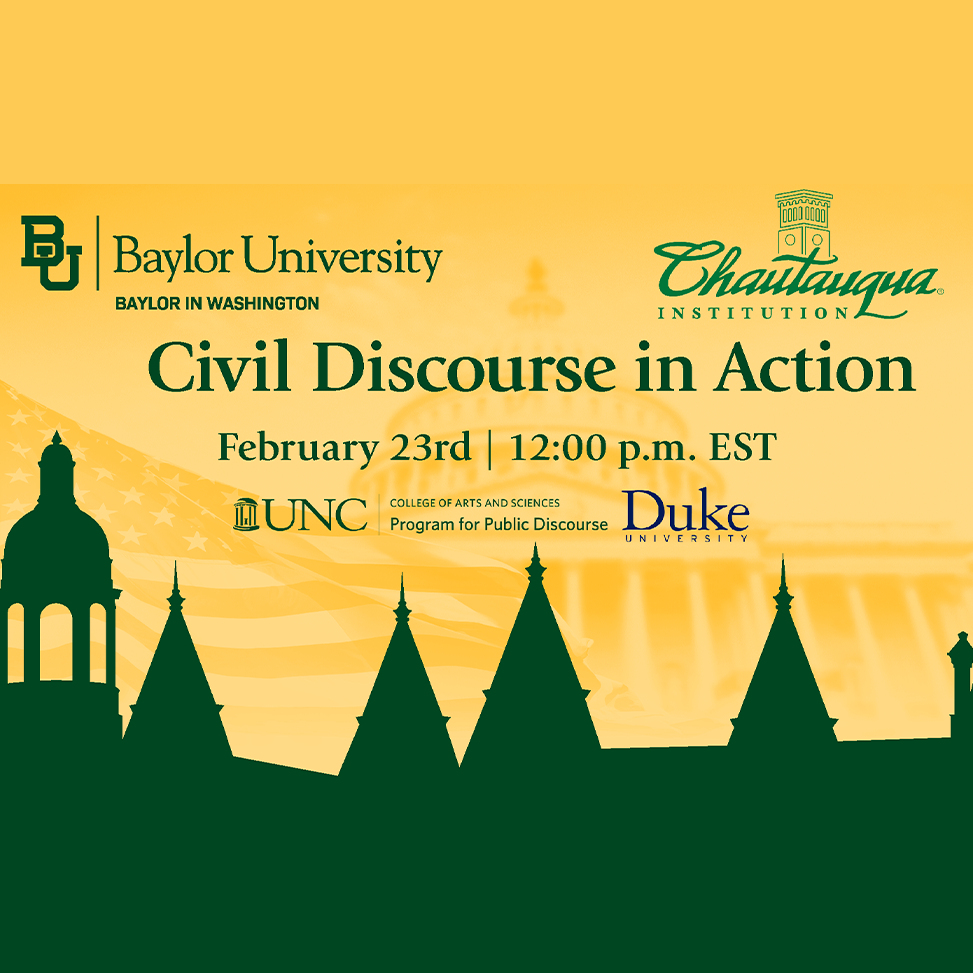
Civil discourse is at the very heart of the American project of self-government, yet its practice today seems to be in peril. The conversation on civil discourse in America has focused mainly on diagnosing the problem, rarely on solutions. Yet a number of private organizations have been making tremendous headway in teaching Americans to discuss controversial issues across the divide. Some of these organizations are well known, some uncelebrated. But together, they are a beacon of hope.
On February 23rd at 12:00 pm EST, Baylor in Washington hosts an online panel discussion on successful techniques for improving our culture of civil discourse
Presented by Baylor in Washington and the Chataqua Institution with support from the Duke University Civil Discourse Project and the UNC Program for Public Discourse.
On February 23rd at 12:00 pm EST, Baylor in Washington hosts an online panel discussion on successful techniques for improving our culture of civil discourse
Presented by Baylor in Washington and the Chataqua Institution with support from the Duke University Civil Discourse Project and the UNC Program for Public Discourse.
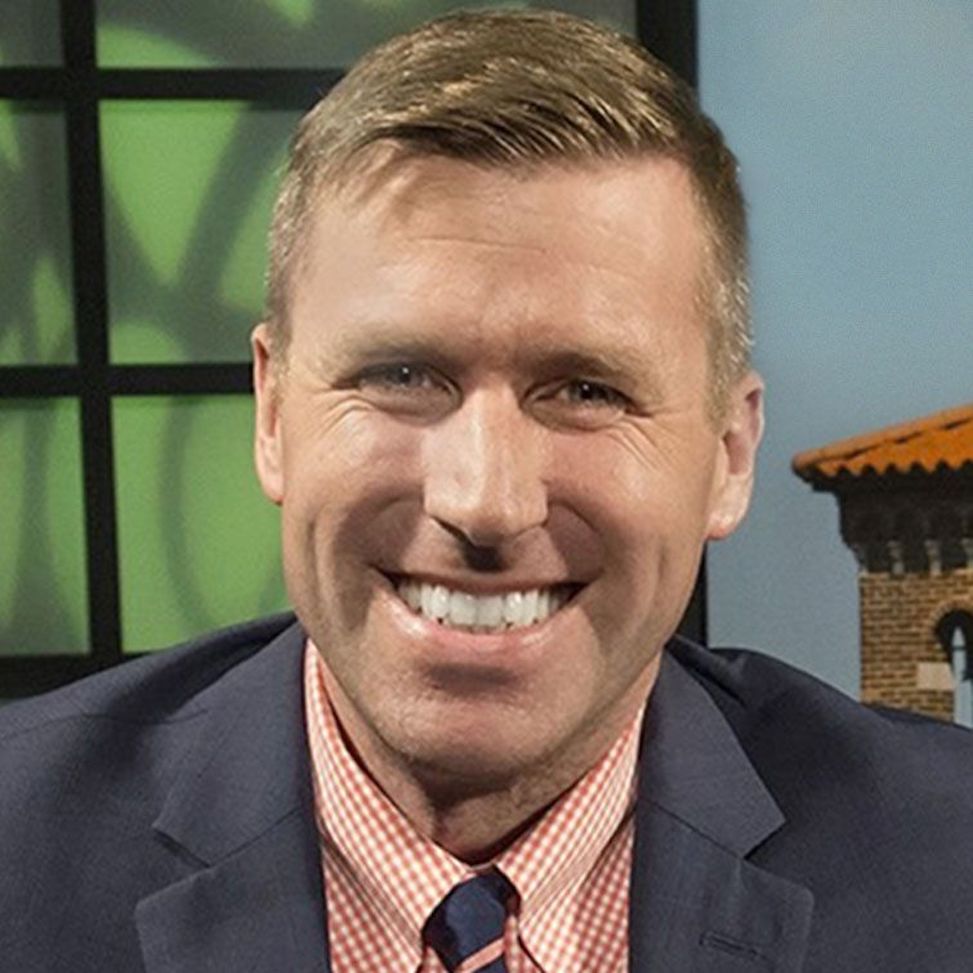
Michael E. Hill has served as the 18th President of Chautauqua Institution since 2017. His tenure has ushered in a fresh, expanded vision for the Institution as it approaches its sesquicentennial in 2024, with emphasis on building its brand and thought leadership through a focus on expanding engaged dialogue in the nation, an evolution to year-round programming, and revitalizing “The Chautauqua Movement.” Prior to his appointment at Chautauqua, Hill was president and CEO of Youth For Understanding USA and previously served in executive leadership positions at a variety of Washington-based arts, cultural and social service organizations. He is a member and Secretary of St. Bonaventure University’s Board of Trustees, a member of the Robert H. Jackson Center Board of Directors and a member of the Leadership Network of the American Enterprise Institute. He is currently completing his Ed.D. at Vanderbilt University’s Peabody College.
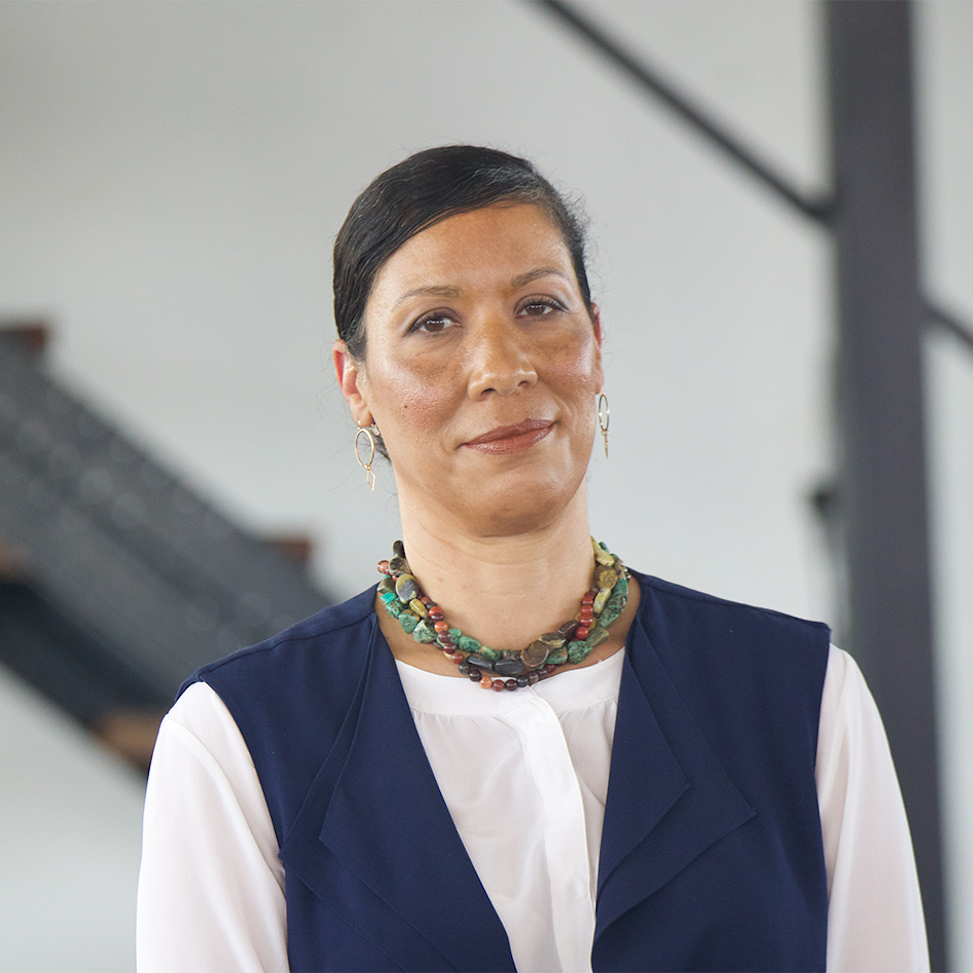
Christy Vines is the President of Ideos Institute, a Christian research and practice institute committed to understanding and advancing the field of empathic intelligence and its role in political and social polarization, and the founding organization of the National Day of Dialogue. A published writer and international speaker on topics at the intersection of faith, conflict transformation, and peacemaking, her work has been published in the Washington Post, Religion News Service, Capital Commentary, and Christianity Today. She is also the Executive Producer of the newly released documentary film, Dialogue Lab: America.
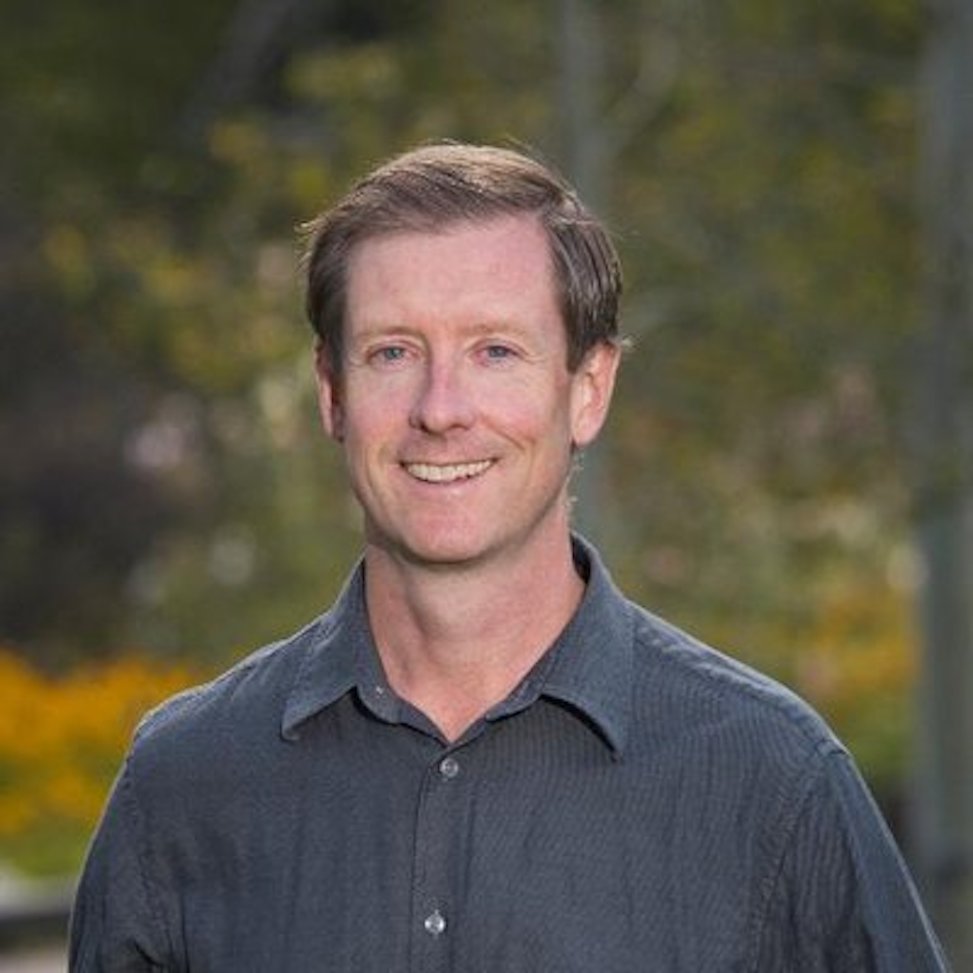
Todd Breyfogle is Executive Director of the Executive Leadership Seminars for the Aspen Institute, overseeing a number of seminar offerings, including the Aspen Executive Seminar on leadership, values and the good society. He is the editor of Literary Imagination, Ancient and Modern (University of Chicago Press, 1999), co-editor of Philosophy, Politics, and the Conversation of Mankind (Colorado College, 2016), and author of On Creativity, Liberty, Love and the Beauty of the Law (Bloomsbury, 2017). Before joining the Aspen Institute, Todd was a Fellow and Program Officer at Liberty Fund (where he gained extensive experience organizing and facilitating great books discussions) and taught in and directed the Honors Program at the University of Denver. A Colorado native, he earned his B.A. at Colorado College (Phi Beta Kappa) in Classics-History-Politics. He attended Oxford (as a Rhodes Scholar), where he read Ancient and Modern History and Patristic and Modern Theology. He earned his Ph.D. at the University of Chicago’s Committee on Social Thought (as a Century Fellow and Javitz Fellow).
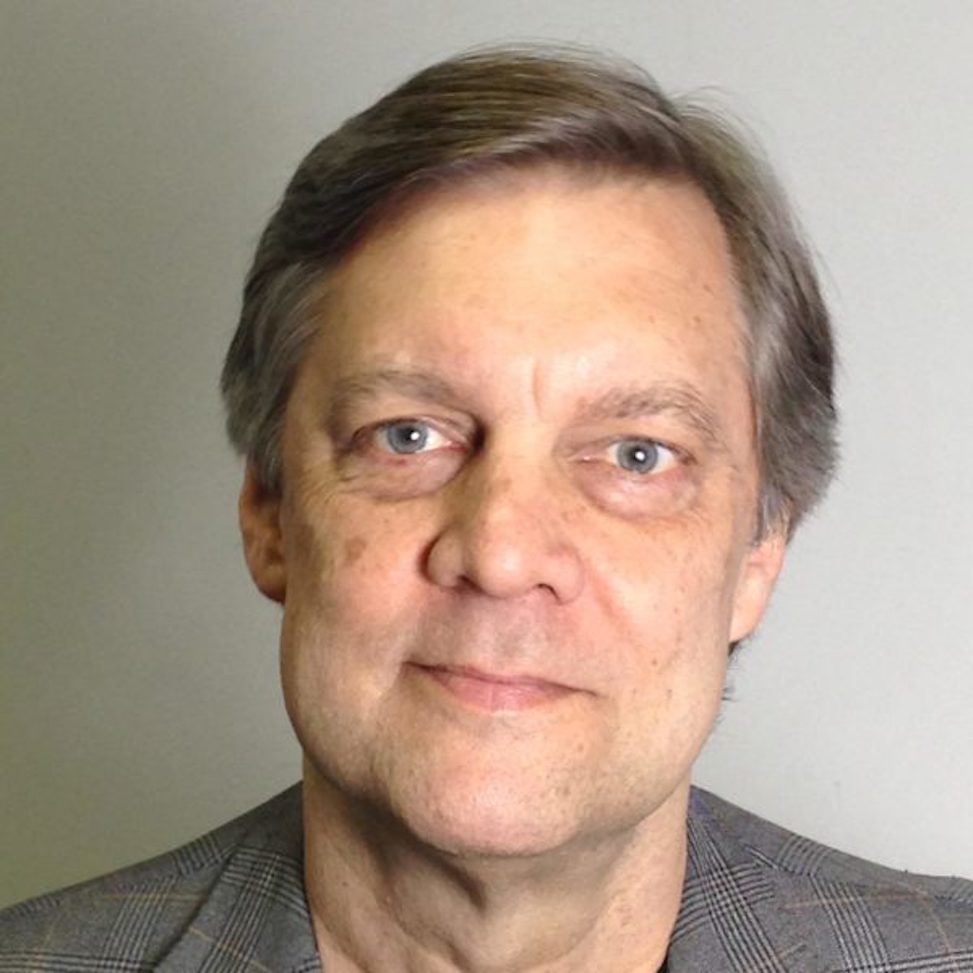
David Blankenhorn is president and co-founder of Braver Angels. He co-founded the National Fatherhood Initiative in 1995, founded the Institute for American Values in 1988, and has authored or co-edited 14 books. He grew up in Mississippi and now lives with his family in New York City.
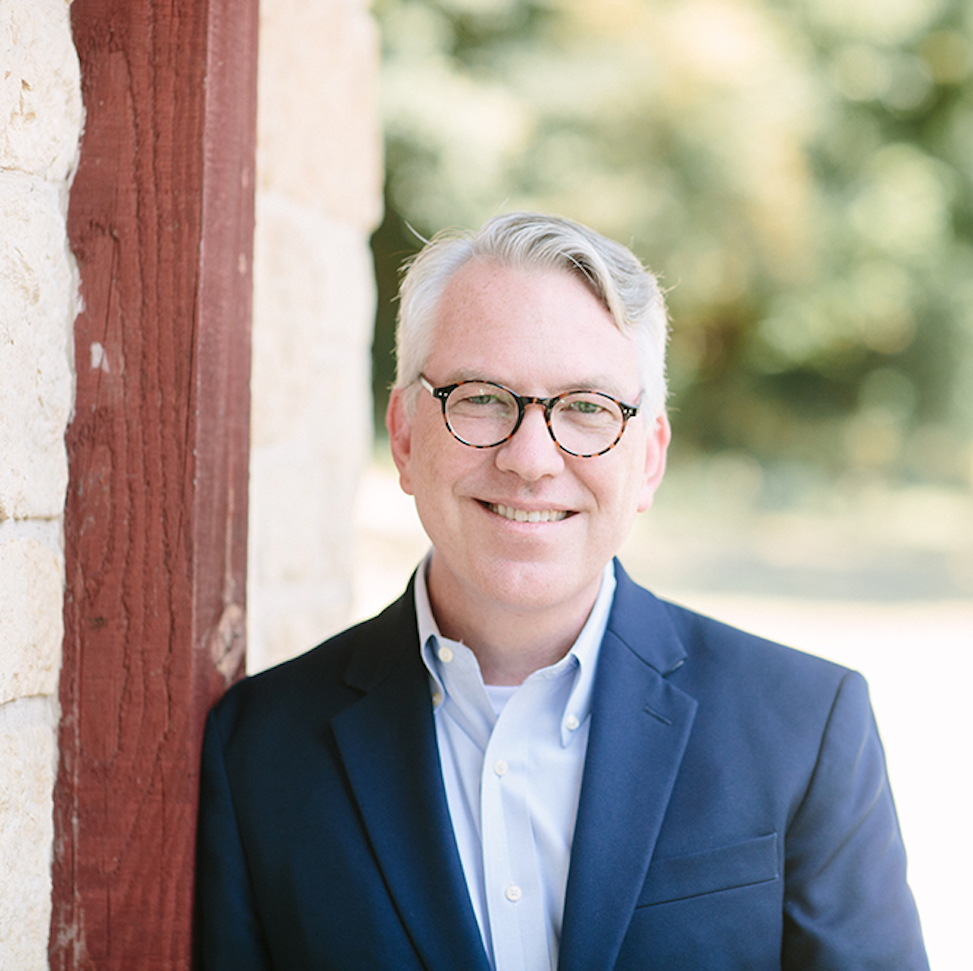
Event Moderator
David Corey is the Director of Baylor in Washington and a professor of Political Science focusing on political philosophy in the Honors Program at Baylor University. He is also an affiliated member of the departments of Philosophy and Political Science. He is the author of two books, The Just War Tradition (with J. Daryl Charles) (2012) and The Sophists in Plato’s Dialogues (2015).
Date: February 23, 2022
Times: 12:00 pm –
Audience: Public Event
Venue: Online, Zoom
Agora Fellows: Dialogue - What is gender?
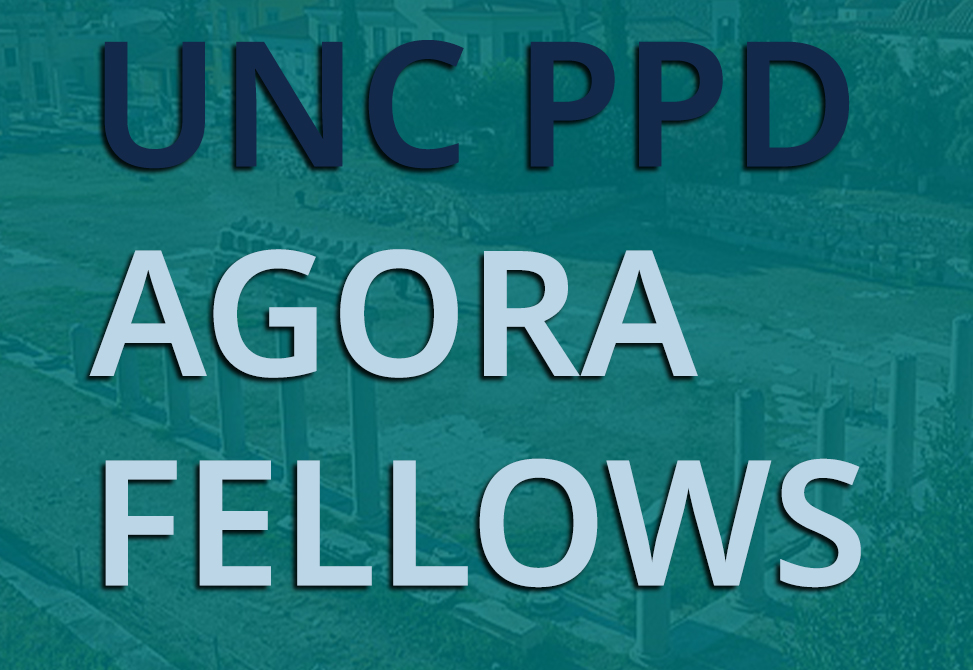
Gender is both novel and banal. On one hand, people have thought and lived with various gender norms for a very long time, and being (or performing, as Judith Butler puts it) woman, man, or otherwise may appear so obvious, so common-sense, that it is not worth exploring. On the other hand, gender has clearly been a topic of great (even international) concern and disagreement for decades, with struggles playing out across the realms of politics, economics, education, and popular culture. Today, gendered struggles and struggles over gender are particularly apparent in swimming lanes, high school bathrooms, passports, #tradwives, and fashion. What is the nature of these struggles, and (why) do they matter? More broadly, how are genders constructed and lived?
Students participating in this dialogue should read the prefaces to Judith Butler's Gender Trouble in preparation, available here.
The Agora Fellows meet bi-weekly on Thursday evenings, 7:00 - 8:30 pm.
Interested in becoming a Fellow? Let us know here.
Students participating in this dialogue should read the prefaces to Judith Butler's Gender Trouble in preparation, available here.
The Agora Fellows meet bi-weekly on Thursday evenings, 7:00 - 8:30 pm.
Interested in becoming a Fellow? Let us know here.
What Universities Owe Democracy: A Conversation with Ronald J. Daniels
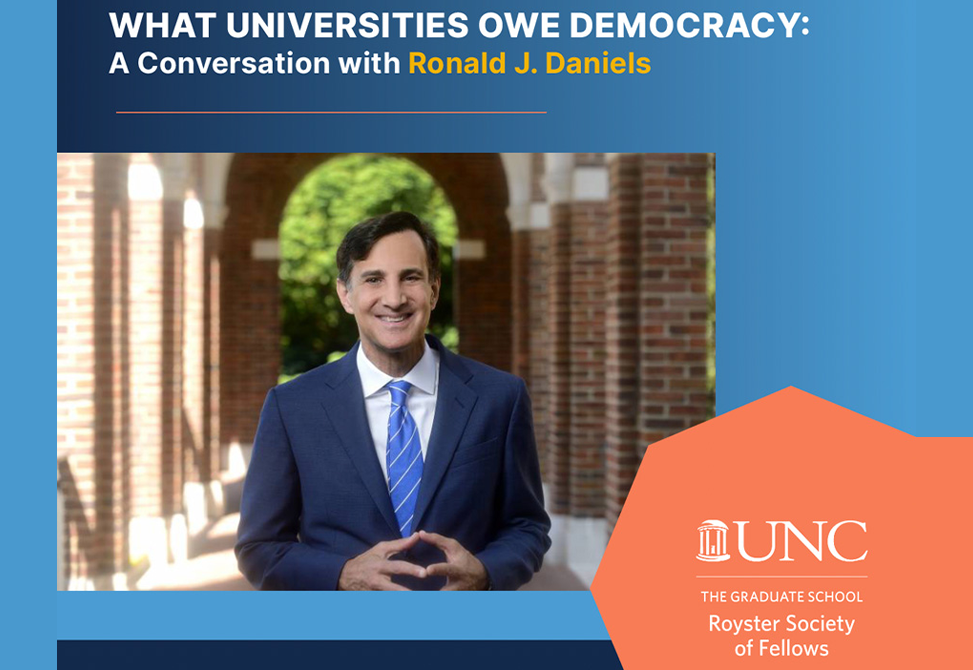
Register to attend in person or online. Space is limited for in-person attendance.
Universities play an indispensable role within modern democracies. But this role is often overlooked or too narrowly conceived, even by universities themselves. In What Universities Owe Democracy, Ronald J. Daniels, the president of Johns Hopkins University, argues that — at a moment when liberal democracy is endangered and more countries are heading toward autocracy than at any time in generations — it is critical for today’s colleges and universities to reestablish their place in democracy.During this hybrid event, President Daniels will discuss his new book followed by an audience Q&A.
This event is sponsored by The Graduate School at UNC-Chapel Hill and its Royster Society of Fellows, the Institute for the Arts and Humanities, the Program for Public Discourse, the Carolina Seminar Higher Education Working Group, and the Democracy Initiative within the Carolina Next: Innovations for Public Good Strategic Plan.
Date: February 16, 2022
Times: 03:00 pm – 04:30 pm
Audience: Public Event
Venue: Wilson Library - Pleasants Family Room; Online
Leading Controversial Conversations: Facilitating Productive Dialogue
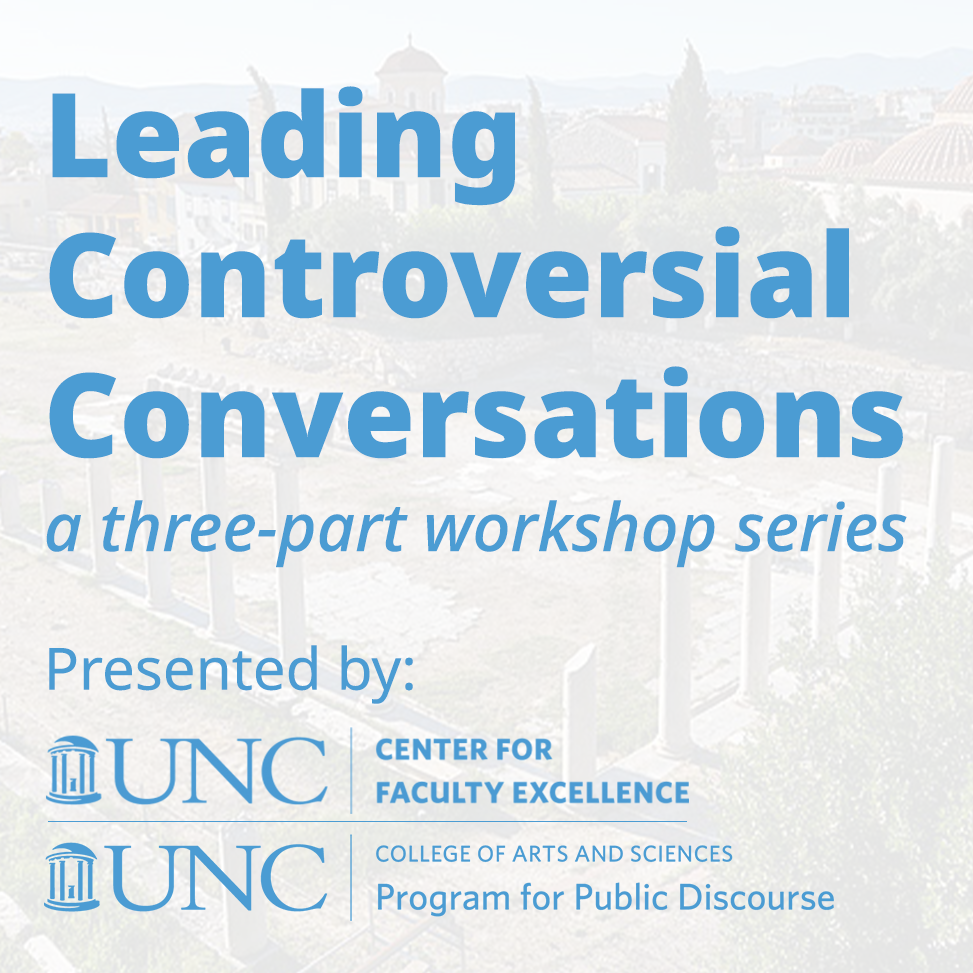
Register here through the Center for Faculty Excellence
This semester, the Center for Faculty Excellence and the Program for Public Discourse invite UNC faculty to participate in a series of three workshops designed to empower educators across the curriculum with the necessary tools to facilitate robust discourse across controversial terrain.Join us for this workshop focused on facilitation techniques for engaging students in civil and honest discussion in the classroom. We will discuss strategies for establishing a shared context for conversation, offering multiple modes of participation, challenging dominant narratives, and addressing microaggressions.
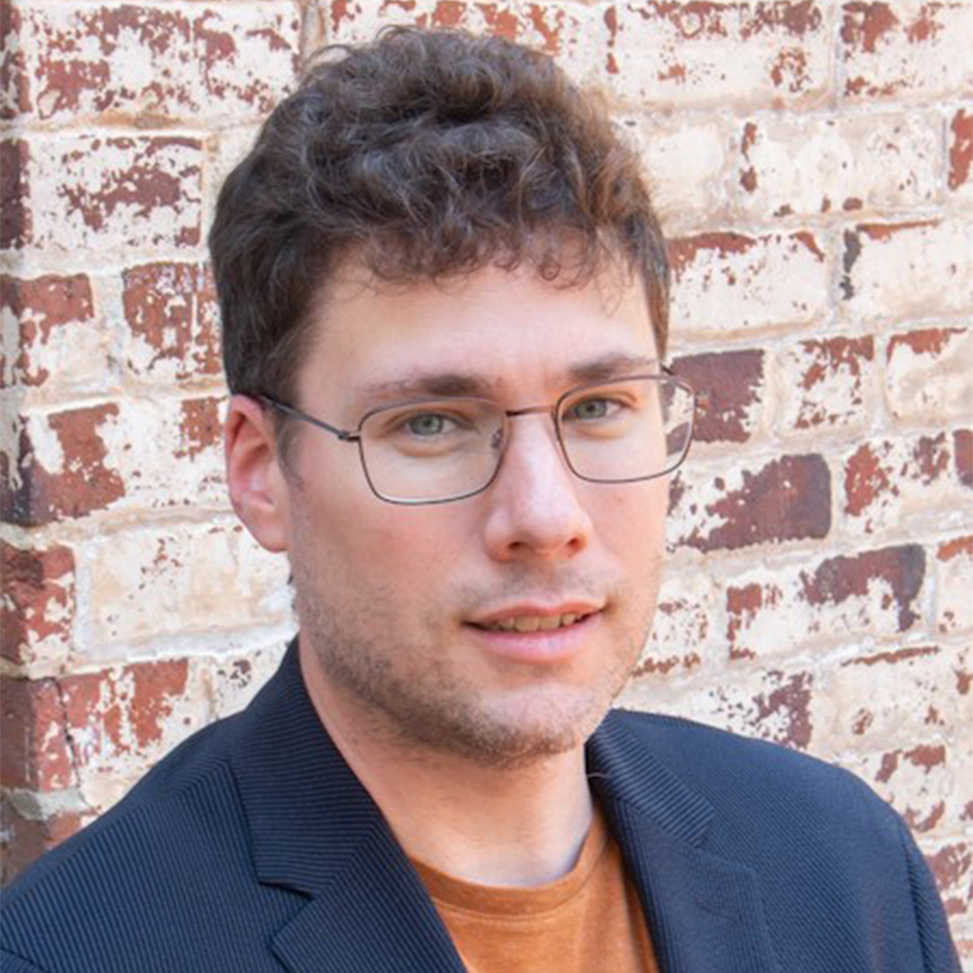
Event Moderator
Kevin Marinelli serves as Executive Director of the Program for Public Discourse and teaches in the Department of Communication. He teaches courses in rhetorical studies, and his scholarship centers on public argument. He has published essays in Rhetoric Society Quarterly and Argumentation and Advocacy, including his most recent essay on the emergence of Black Lives Matter. Kevin also leads the Agora Fellows, a group of undergraduate students committed to the study and practice of public discourse in contemporary democracy. Currently, Kevin is investigating practices of rhetorical citizenship.
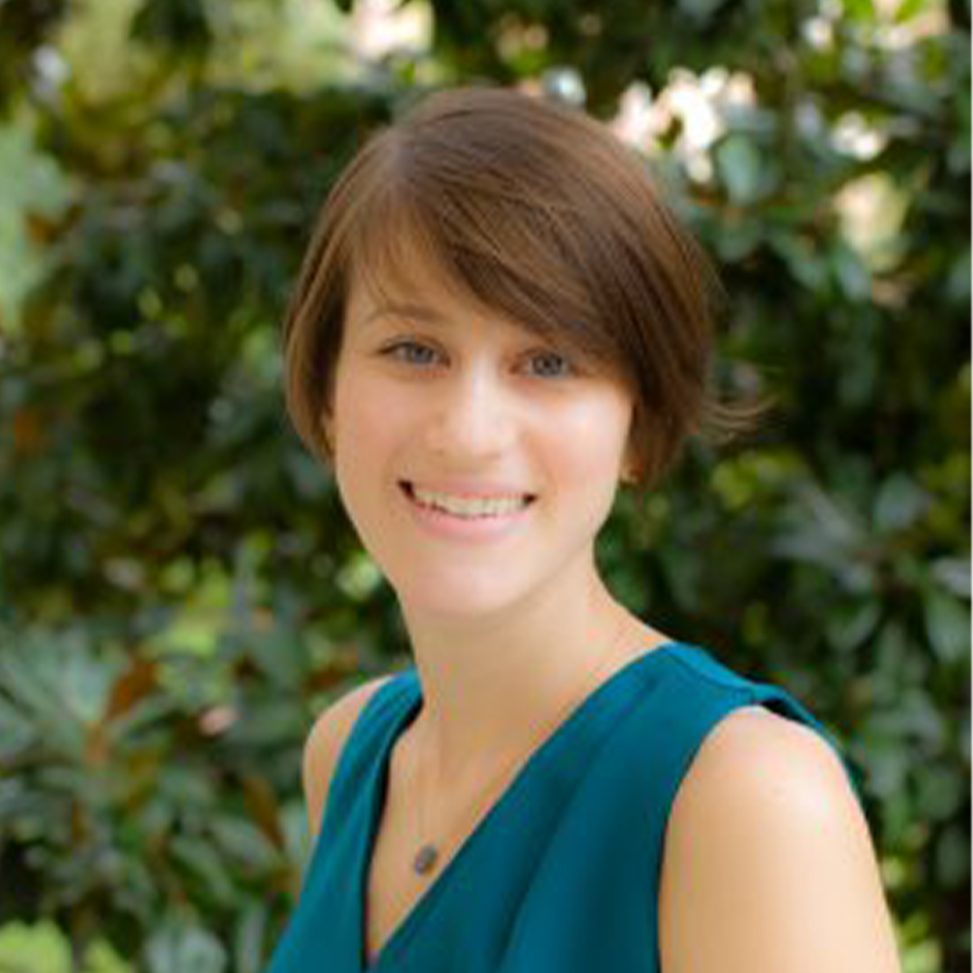
Emily Boehm is a PPD Faculty Affiliate and an educational developer and evolutionary biologist working with faculty members to bring active and inclusive learning methods to their classrooms, leading the CFE’s initiatives for faculty new to UNC. She also serves as the co-facilitator for the Faculty Administrator Development Program.
Date: February 15, 2022
Times: 03:00 pm – 04:15 pm
Audience: UNC Faculty
Venue: Center for Faculty Excellence, Online
Abbey Speaker Series: Science and Democracy
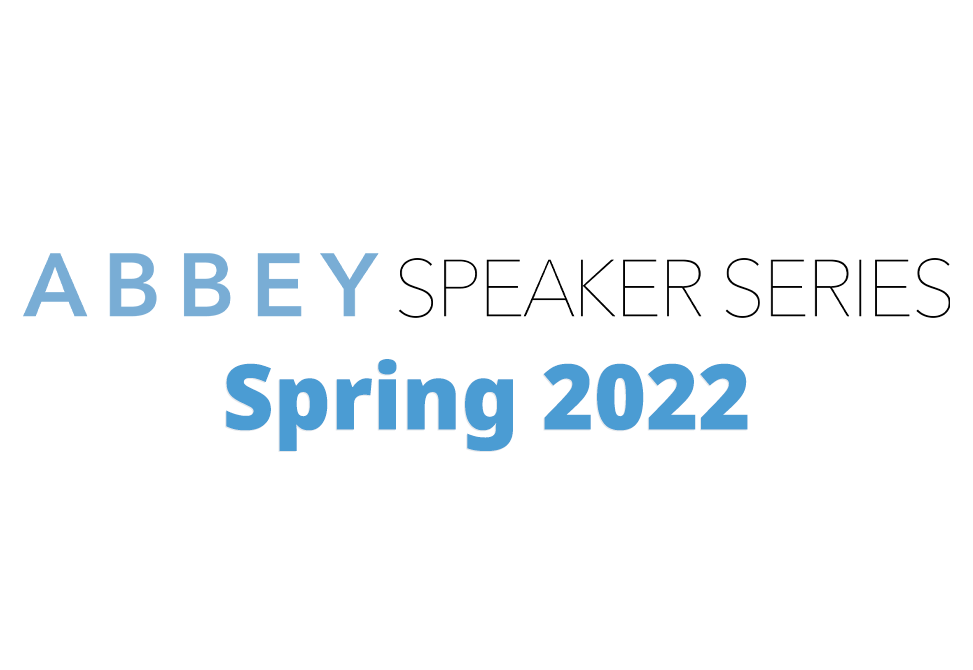
Watch this event
Does politics belong in the laboratory? Is science inevitably political or does politics hinder good research?As the 12th largest research institution in North America, this discussion is paramount at UNC-Chapel Hill. On February 8th at 5:30 p.m., the UNC Program for Public Discourse and General Alumni Association bring together scientists from academia and publishing for Science and Democracy, an online Abbey Speaker Series event exploring the interplay of science and politics.
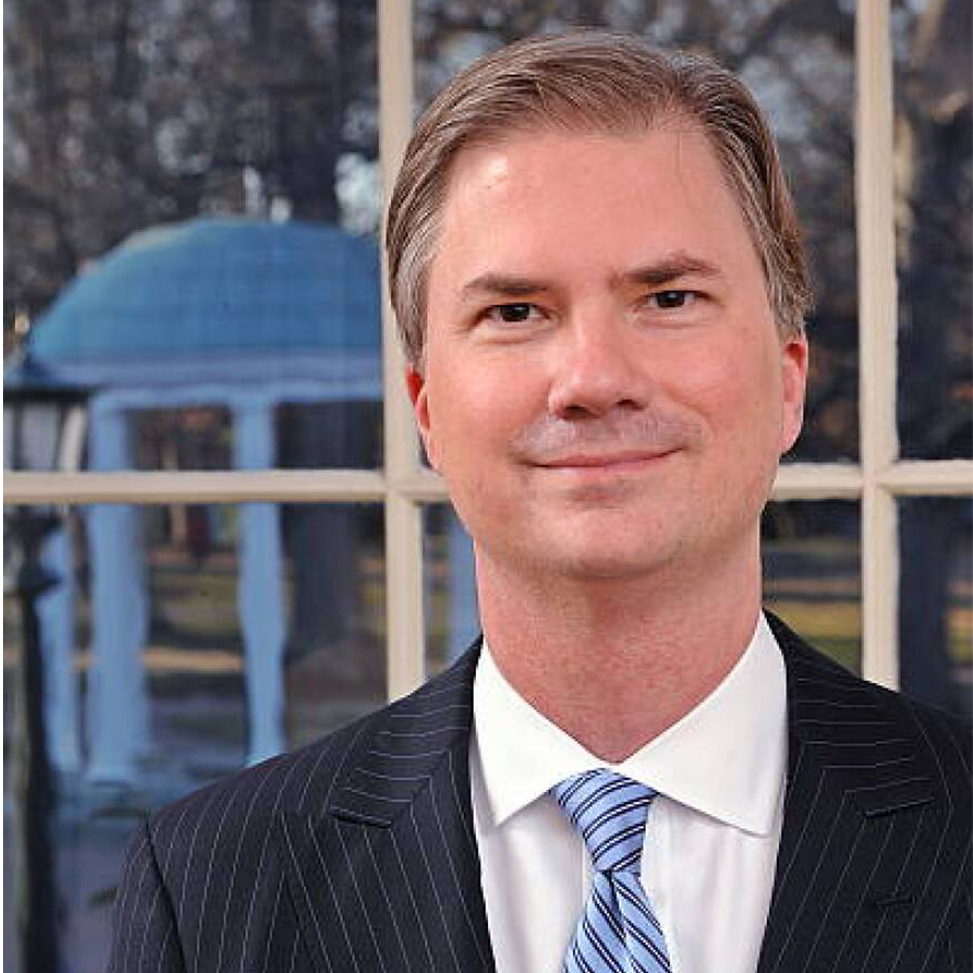
Holden Thorp ‘86 is the current editor-in-chief of Science and former chancellor of the University of North Carolina at Chapel Hill, a position he held from 2008 - 2013. Before his selection as chancellor, Thorp taught at UNC for 15 years, during which time he directed the Morehead Planetarium, was appointed as a Kenan professor and chair of the Department of Chemistry and served as dean of the College of Arts and Sciences. Thorp co-founded two biotechnology companies and has written two books with co-author Buck Goldstein about higher education's role in entrepreneurship and its relationship to the American people. Between his appointments at UNC and Science, Thorp served as provost of Washington University in St. Louis.
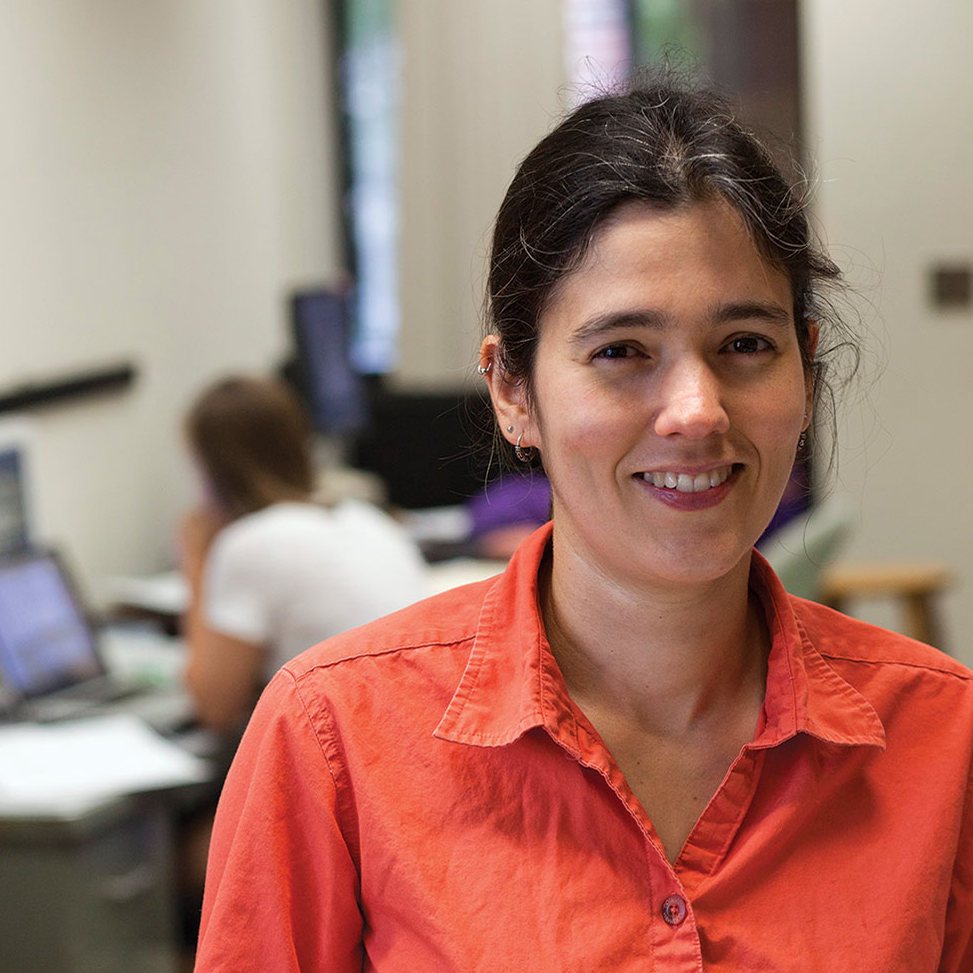
Luana Maroja is an associate professor of biology and chair of the biochemistry and molecular biology program at Williams College. Her areas of expertise include evolutionary genetics, speciation, and landscape genetics, and she teaches courses on evolution and leads a lab researching the evolution of barriers to gene exchange. Maroja’s work has been published in various journals, including Ecology and Evolution, G3, and Nature, and she wrote for The Atlantic about the potential dangers of self-censorship in the sciences in higher education. Maroja holds bachelor’s and master's degrees from the Universidade Federal do Rio de Janeiro and a doctorate from Cornell University.
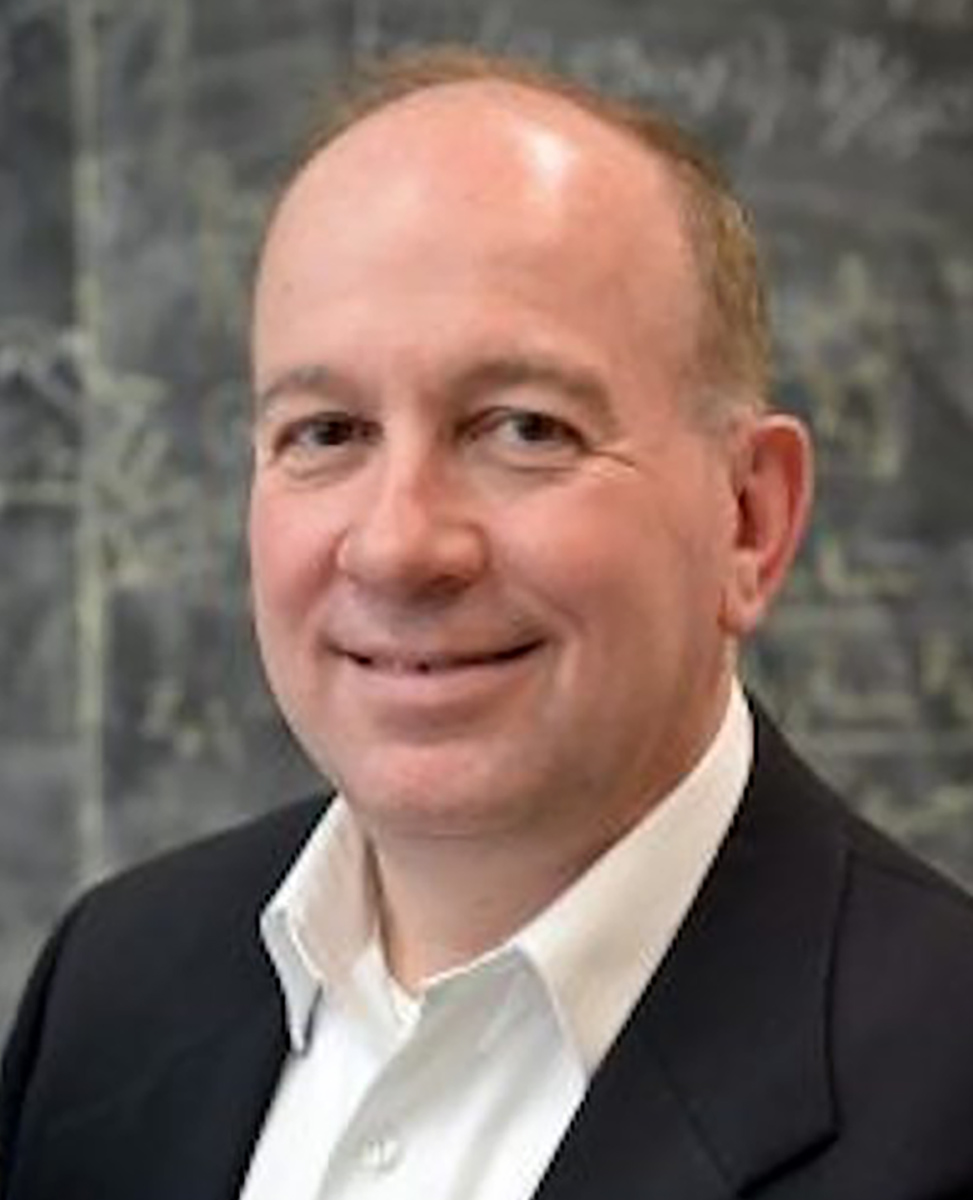
Event Moderator
Chris Clemens is Provost and Jaroslav Folda Distinguished Professor of Physics and Astronomy at the University of North Carolina at Chapel Hill. He has held numerous administrative roles at Carolina, including department chair, senior associate dean for natural sciences, and senior associate dean for research and innovation. In these roles, he helped launch the Environment, Ecology, and Energy program (E3P) and collaborated with chairs to build the research enterprise and develop the curriculum in the College’s newest departments — applied physical sciences and biomedical engineering. Clemens holds a bachelor's degree in astrophysics from the University of Oklahoma and a doctorate in astronomy from the University of Texas at Austin.
Date: February 8, 2022
Times: 05:30 pm – 07:00 pm
Audience: Public Event
Venue: Online
Agora Fellows: Debate - Should gambling be legalized?

The Agora Fellows' first topic this semester is a nuanced one; it invites meaningful discussion and encourages us to think about questions that are multifaceted and often contingent. What counts as gambling? Who decides? Should there be restrictions on who can gamble, or where they can do so? What are the various costs associated with gambling? The benefits? Consider the various ways you might approach the question (foregrounding economic or moral or public health concerns, for instance), and how that might lead to different answers.
Participants should read at least one of the following sources:
Interested in becoming a Fellow? Let us know here.
Participants should read at least one of the following sources:
- “The Supreme Court opens up sports betting across the country”
- “Gambling boom in 2021 sets new record after pandemic slump”
- “‘Prior to gaming, we had nothing.’ Cherokee deem sports gambling a success”
Interested in becoming a Fellow? Let us know here.
Agora Fellows: Introduction and Topic Deliberation

The Program for Public Discourse invites all undergraduates to join or attend a meeting with the Agora Fellows, a cohort of students committed to the study and practice of public discourse.
This first meeting gives new and returning Fellows a chance to meet with Kevin Marinelli and our new graduate fellows, Nick Gerstner and Josh Youakim from the Department of Communication, for a discussion about what topics to cover in this semesters' debates and discourse.
The Agora Fellows meet bi-weekly on Thursday evenings, 7:00 - 8:30 pm.
Interested in becoming a Fellow? Let us know here.
This first meeting gives new and returning Fellows a chance to meet with Kevin Marinelli and our new graduate fellows, Nick Gerstner and Josh Youakim from the Department of Communication, for a discussion about what topics to cover in this semesters' debates and discourse.
The Agora Fellows meet bi-weekly on Thursday evenings, 7:00 - 8:30 pm.
Interested in becoming a Fellow? Let us know here.
Leading Controversial Conversations: Laying Ground Rules for Discussion

Register here through the Center for Faculty Excellence
This semester, the Center for Faculty Excellence and the Program for Public Discourse invite you to participate in a series of three workshops designed to empower educators across the curriculum with the necessary tools to facilitate robust discourse across controversial terrain.Robust discourse requires candor, and candor demands a climate of trust. In this workshop, Professor Marinelli will simulate his “Ground Rules for Discussion” class activity, designed to foster a robust climate of public discourse by cultivating a healthy disposition toward disagreement. Faculty across the curriculum are invited to participate in a workshop that will prove especially useful at the start of the semester. Both faculty with minimal-to-no experience and those seasoned in facilitating controversial conversations are encouraged to attend.

Event Moderator
Kevin Marinelli serves as Executive Director of the Program for Public Discourse and teaches in the Department of Communication. He teaches courses in rhetorical studies, and his scholarship centers on public argument. He has published essays in Rhetoric Society Quarterly and Argumentation and Advocacy, including his most recent essay on the emergence of Black Lives Matter. Kevin also leads the Agora Fellows, a group of undergraduate students committed to the study and practice of public discourse in contemporary democracy. Currently, Kevin is investigating practices of rhetorical citizenship.

Emily Boehm is a PPD Faculty Affiliate and an educational developer and evolutionary biologist working with faculty members to bring active and inclusive learning methods to their classrooms, leading the CFE’s initiatives for faculty new to UNC. She also serves as the co-facilitator for the Faculty Administrator Development Program.
Date: January 18, 2022
Times: 03:00 pm – 04:15 pm
Audience: UNC Faculty
Venue: Center for Faculty Excellence, Online
Agora Fellows: Semester Review

The Agora Fellows meet to review their discourse for the Fall 2021 semester.
The Agora Fellows meet bi-weekly on Thursday evenings, 7:00 - 8:30 pm in Bynum 336.
The Agora Fellows meet bi-weekly on Thursday evenings, 7:00 - 8:30 pm in Bynum 336.
Agora Fellows: Reading Reflection

The Agora Fellows meet for their second discussion of Parts VI-VII of Danielle Allen's Our Declaration: A Reading of the Declaration of Independence in Defense of Equality.
The Agora Fellows meet bi-weekly on Thursday evenings, 7:00 - 8:30 pm in Bynum 336.
